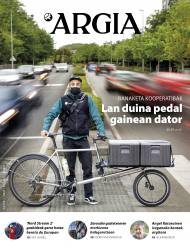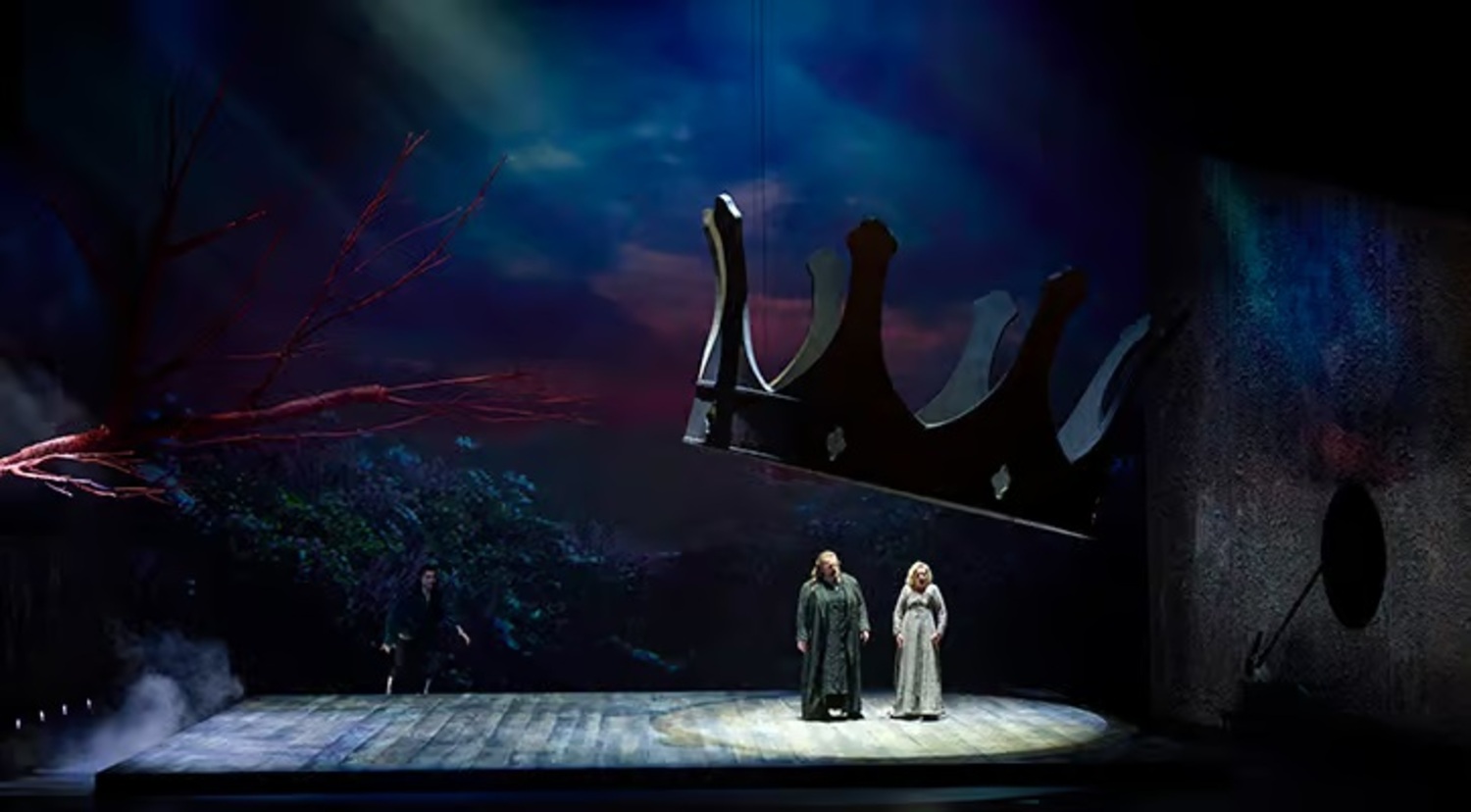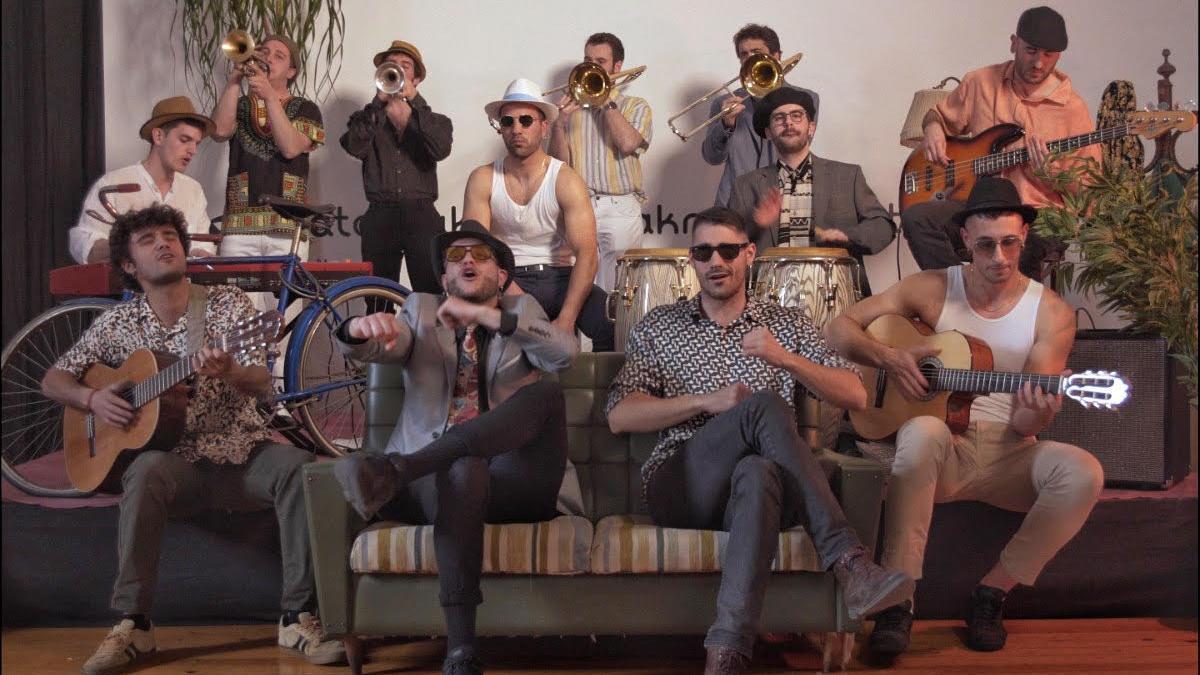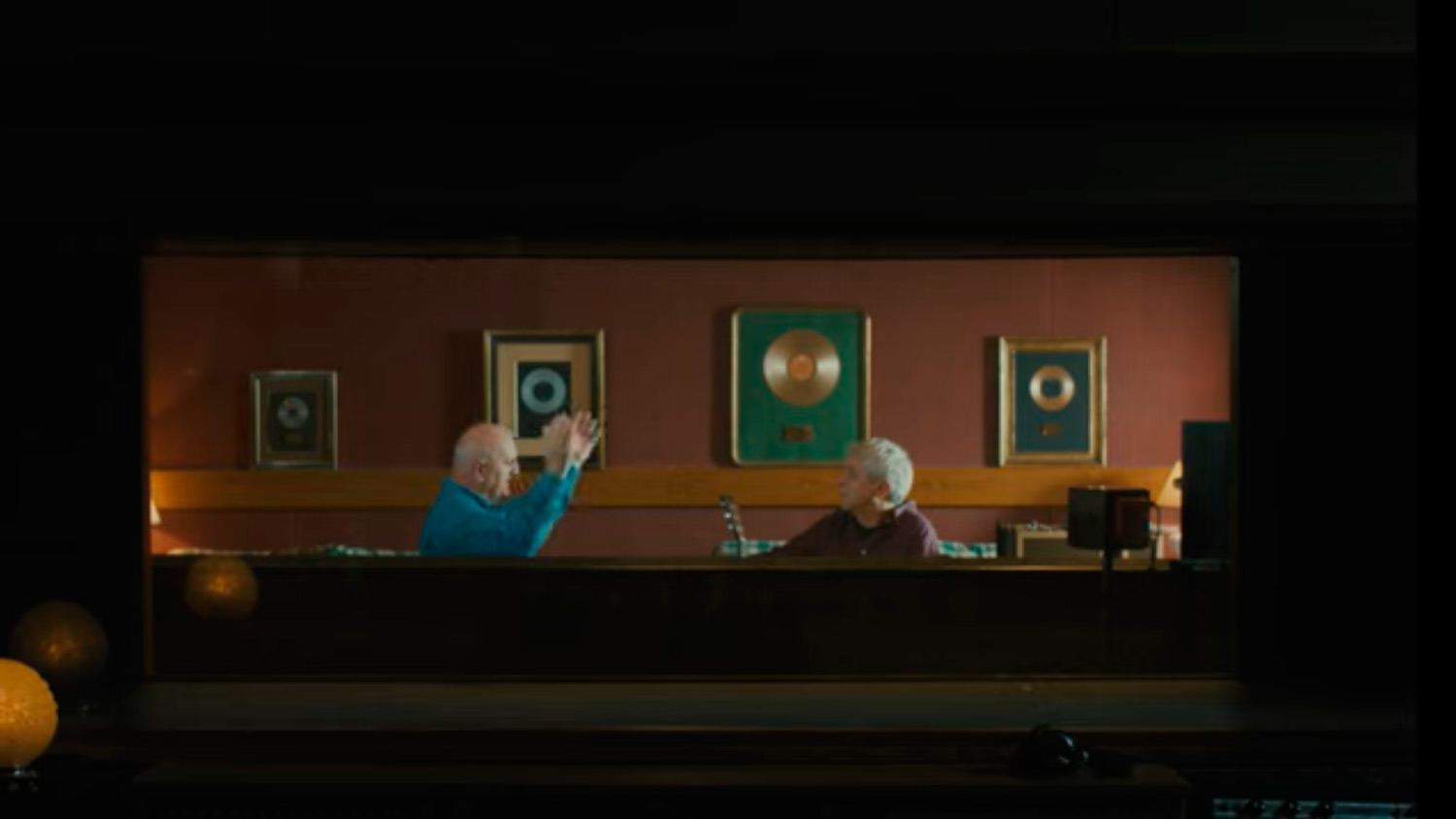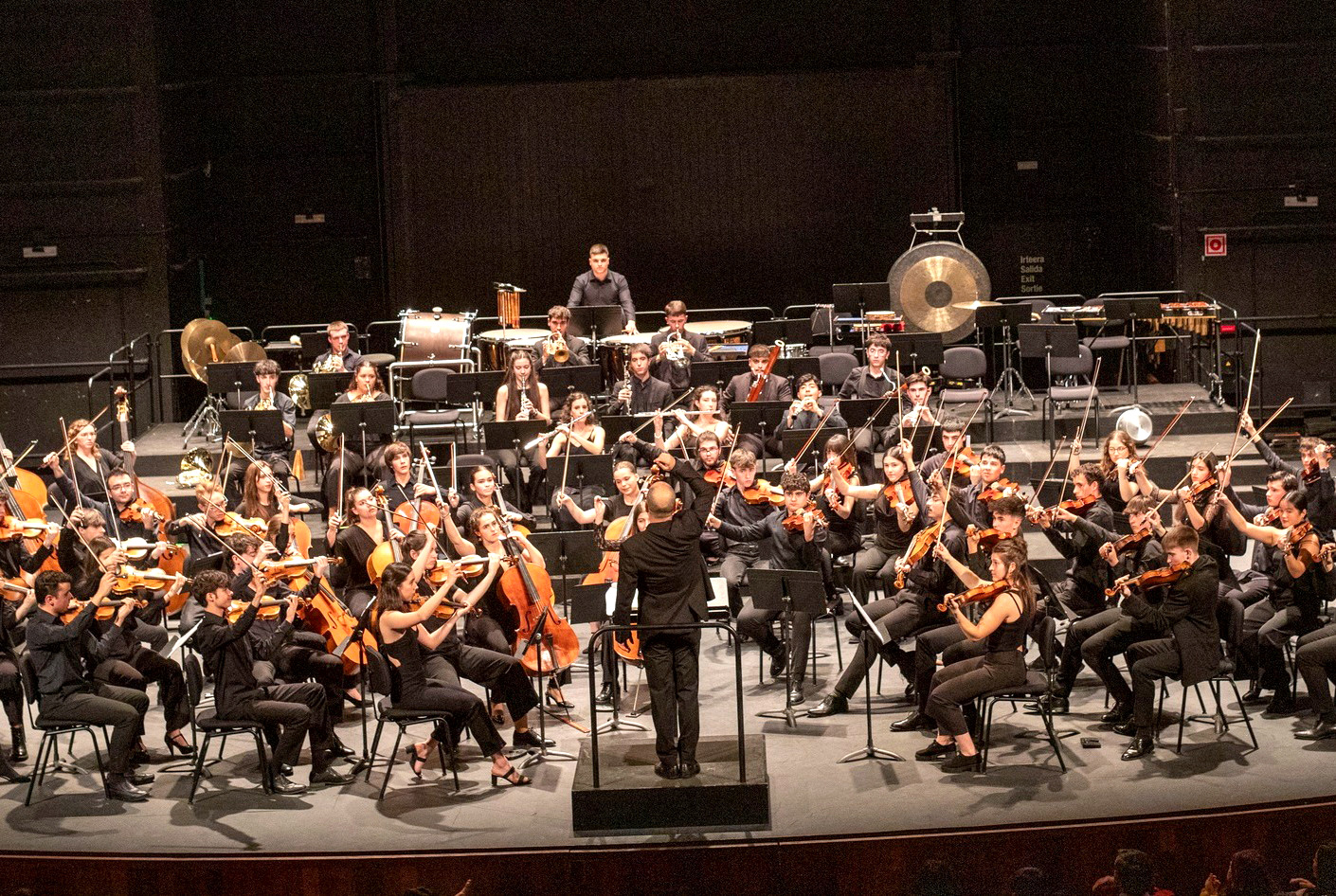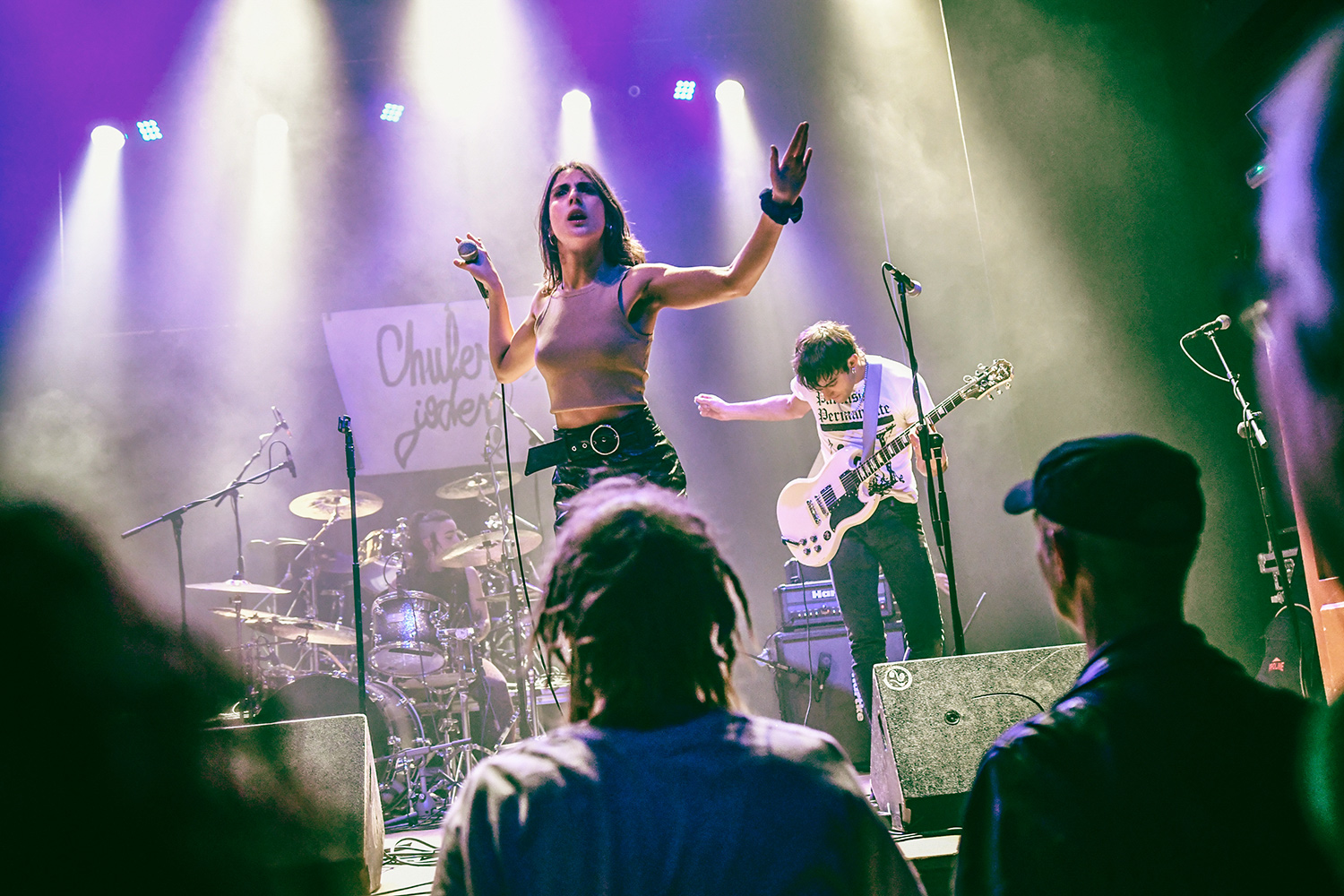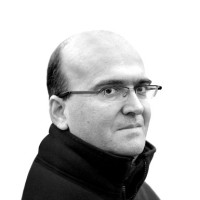"I was surrounded by sounds and it was impossible not to make songs."
- Angel Katarain is a well-known sound technician, but nobody knew that when everyone left the IZ study he stayed there, experimenting with the instruments found in front of him. Between 1983 and 1993 he recorded 42 songs that evoke environments coldwave or post-punk – rare and quite rare pieces at the time it was made in these cafes. The promotion has always been annoying, so for many years he has been in the shadows, showing only his friends and relatives if they hung him in a bandcamp direction. Now, the new label Hegoa Diska has republished a collection of selection of these songs, and with the excuse of it we have gathered in the Plaza de Ordizia. The boring musical speech has soon brought us into the political atmosphere of the time, and so the continuous arrests, the escapes of the caves, the murder of his sister Yoyes, etc. have come to light.

Angel Katarain González (Ordizia, 1961) does not like the media too much. “With your sister’s affairs, the sensationalist press has often been around and you end up hating what it doesn’t deserve.” Once the interview proposal was made, however, it does not say no: “I never discard having a coffee with whom I want to talk. If you come with the engraver to Ordizia Square we will talk and if something comes out that is worth it, you can publish it.” Katarain has grown among artifacts: At 12 years old, grandpa was able to build loudspeakers with the help of a carpenter. Later, with the help of Fernando Unsain, he joined the IZ study as a sound technician. He participated in the birth of M with his best friend Kaki Arkarazo, who would later reconvene in the Matxinadak project, but gradually moved away, as the group interiorized the echoes of English punk. In 1995 he created the Azkarate study together with Jonan Ordorika and Amaia Apaolaza. This cycle is now being closed, taking the trouble out of the study and taking care of Iara, “dedicated to motherhood”. However, he doesn't have time to get bored.
The album gathers songs made between 1983 and 1993. What did you think of the election of Mikel Acosta?
I was surprised by the proposal. Making music of this kind has served me so far for very little – like losing money and accumulating record packs at home. But it's not easy to find motivated people, and I didn't take off a.Hizo two versions of the album, and I liked both. The first came a bit long, it didn't fit in the vinyl. Cut a bit, the nine songs remained. Between 1983 and 1986 everything is engraved by micro on magnetic tape, without major technical aids, recurring and reusing. Electronics have a bit of weight here (I only used the old rhythm boxes and keyboards of the time). The next ones, on the other hand, are recorded in digital and electronics is gradually gaining weight. When it comes to mastering, we have had to work mainly on the relationship between old and not so old songs. In any case, Mikel has given priority to the older ones.
I have the impression that the cover of Jon Zabaleta takes your musical world well.
He understood that perfectly. I think Mikel was going to tell her something. That guy who appears encapsulated -- that's how it was. We lived in our bubble, which did not see us if it was possible, always pointing the guns out [laughter]. My grandfather used to cast strange sentences and once said to me, “Angel, half of the world lives looking out and the other half looking inwards.” My music was intimate. I didn't like the lack of control and the scandal, and that was what linked rock, punk and traditional folk. They were outward-oriented messages. Almost all the groups I had to record when I started working on IZ, despite the variety of styles, were outdoors, and that has to do with discovery, selling and those things. I've never had an interest in getting out of my capsule. I enjoyed doing it, but thinking about promotion was very hard for me. I think it is good for people to do so, but I have never felt like it.

In the musical landscape of that time, there was nothing like what you did. What caused you?
Little, or I don't know what. Sometimes I made songs and then I found Kaki Arkarazo. He was very interested in music from the outside. He said to me: “There’s a team like you do,” and he brought me the album from The Residents. Or when I heard a song from me, it said to me: It looks like Brian Eno, or Cocteau Twins, or Laurie Anderson. And I realized it was like this, but I didn't hear them until then. Nobody invents anything, in the world there is always someone who has done something very similar to you before. There's just one album that knows how it came to my house and I constantly put it: Timewind by Klaus Schulz. I don’t know how the mind works, if we reflect what we hear outside, but my style hasn’t been “I’ll look at what this does, to see if it resonates with me.” I haven't had that much interest and need. I found the song. In the mornings, as I recorded the works of others in the studio, the song was going to be recorded the night I was going to be around.
Then the songs came to you all the way.
The melodies came to my head, and if I didn't have a hand recorder, they disappeared. Bob Dylan said: “The music is there, it has its own experience and just wants someone to see it and record it.” I think he is right. The song comes out suddenly. The part of a puzzle is like completing it as it grabs it in the air, surrounds you and you drive it to the recorder. If I couldn't do it myself, I was helped by Kaki or Amaia Apaolaza, when he was then my accomplice. I would sing melodies to them, and they would pull the song out with the guitar or with the keyboard. And the other musicians in the studio were at risk of participating if they stayed until late [laughs]. But the day comes when music doesn't surround you, and then you have nothing to channel -- and if you try, all you'll do is a botch. At that time, because I was surrounded by sounds, it was impossible not to make songs. It's like when you're in love with someone: don't relax until you tell them. I waited for the night to come, fearing that the songs were going. When I was left alone in the studio, I would look at the instruments in my environment, I would pick up and start some. Until I knocked the song down, I didn't stay. Sometimes I would spend the whole night making a song, and the next day, when the day was over, I would mix it up. For me, the most important thing was to get rid of the song. Either I see, or tomorrow will be something else. I couldn't allow the song to escape.
"It's like when you're in love with someone: don't relax until you say it. I waited for the night to come, fearing that the songs were going.”
But the Sala 5 and Sala 3 songs recorded in the Arrikrutz caves are created differently.
Yeah, what added we went to the caves. He would take the video camera and record the audio with it. Playing the stalactites of the cave we did a kind of txalaparta. That was another sonic world. Besides Arrikrutz, the cave of Troskaeta in Ataun was my own setting. There he kept the reserves of future expeditions. I used to go many times alone, all week I lit up the area with flashlights and candles and took pictures, listening to drops on stalagmites, no clock, eating in the cans, not knowing if it was day or night. I invited a lot of people to try those sensations. That was my home. In the house of Ordizia the parents and nine siblings advanced and regressed, there was all the madness and joy given by such a large family, but also the police at night, demonstrations, general strikes, arrests and continuous explorations… Sometimes it was late in the study because the police were in a furgon for San Sebastian.
For family issues?
Of course. Yoyes was already at the meeting point and the friends and family of the refugees were signed. I took the train to see an exhibition in Madrid and I was stopped on the train, or when I arrived. And if not in controls, on the way to the study, or on the way out of it. Also at concerts. Constantly. I was kicked everywhere and in all colors: first gray, then brown and even green. When you live skiing the streets, overwhelmed, from a moment you become a travelling furniture, a kind of carapace that isolates you from you. I would walk into a kind of diving suit, and from there I would see the world. My crews and friends were very close to the Basque struggle and their music (half ended up in prison or fled). But I also had a hippie group of my friends, Syd Barret, Frank Zappa or David Bowie, some very enthusiastic aliens. Even though they were music lovers, they weren't in creative circles and many ended up hooked on drugs or AIDS. I was quite confused by the police because I was wearing a long mane and a coat of old black hair. They didn't know what it was, the ETA or the jonki. I'm still living in that bubble at the age of sixty. Maybe now I'm thinner, but I'm still seeing the world from somewhere else. At that time, however, I put the diving suit – like self-defense, of course. I needed something, when I was given a shot to get to my head with less force, and to get away from the fears of going out in the street.
.jpg)
And yet, it has good memories of the time.
Fears lived in the air, but we were happy at the same time. There were many positive incentives: freedom, existential environment hippie, mountains… we discussed whether the Taoists or the Buddhists were better, or about the teachings of Carlos Castaneda, or about drugs – if you take this mushroom you will go to this side of the brain – or about mescaline, acids, and everything that could help to deepen our knowledge. But I didn't smoke a canute, because I saw how it affected others. With his journey, I was drugged. And he took them to the mountain, to the caves, to the places where I fled and dreamed. Seen from there, the real world gave a comic book without grace and plagued with manure. After a few days we landed in the village and there it was all mobilization. I was in favour of the independence of individuals, but I would not dream of the independence of nations. What were the nations? I felt far from that world. All the borders of the world are made of wars and blood, and what and here do you want to put more? It seemed very good to me to drive away those policemen who persecuted me, but I did not agree very much with the dynamics of the Basque left. I was also not against it, and I was helping if I had to help, although it didn’t really matter much – when I was invited to the acts I told them that I was free. I was friends with people who hated each other, but I felt good about anyone who felt open to them. In my bubble, something said to me: you can stay here, not here. I have always approached those who have joined me. Friends are not chosen for their ideas or thoughts, but for a kind of vibration that we don't know very well what it is. We tune it in with him.
Surely it works the other way around: you end up thinking about what you think about the people around you…
Yes, it's the other way around. But when you're young, you think you're with your friends because they think like you. I quickly realized that I wasn't, because every day I was in the studio with people who were on the opposite side, whether politically or musically. As a child, I had to learn to live with opposing ideas to leave the house. In the end, you realize that there are links that have nothing to do with ideas, that are stronger, and lengths that are more effective because they make people change. There is something that has to do with openness. Some are more open, some are more closed. And others are told they'll open, although they can be closed for a moment. You feel it, that person over time will open up and know how to contrast their worlds. And finally, there are others that you never see that they're not going to open up, some donkeys, some good and good purposes, others that you have to have far away, that you're going to be sucked into the final drop of energy to realize. But those who seem open-minded have the same concrete thinking that they have at any given time, because they will continue to open up without your help. And they can also enrich you from that inequality.
The day Yoyes was killed, you entered the studio and spent the night making songs. How do you remember it?
First of all, I want to comment on what happened in the Basque Country at that time. Although hard, it's nothing special, it responds to universal cycles that repeat over and over again in history. Man sometimes invents and sometimes doesn't. Openness accepts error, improves it, evolves. Carnivals don't. And when they become the majority, or when they manage to manipulate others, collective disasters begin. It's happening now in many places on the planet. Reasonable and inspiring movements when it comes to creating, sometimes gradually close their eyes and end up being a tragic disaster. They are the spirals of absurdity, they destroy everything in front of them, and in the end they become institutions condemned to disappear. After many years comes a new collective vision that sees it from another side, and now we can't understand what happened. How do we tell our children? You think we were shattered. But who knows, maybe the next generation will own their own dirty spiral, and they will completely surround it and live it as normal. We do not learn, we repeatedly make mistakes.

A few weeks before the murder I spoke to him in San Sebastian and I already knew, fed up, that the last neuron left the table where decisions were made about life and death in ETA. I was afraid of death. For me it was a huge exaggeration. Poles yes, but so much – and so many – no. I thought I knew them, and I told you that. But a few days I proved I was right. At the moment you feel sadness and anger, you don't know well about what. More than a being, you condemn the entire universe because you feel that it has risen up against you from the coup. The glass of your bubble evaporates, the image disappears and your legs ignore you. That night the six songs of Yoyes 1986 emerged without light. Sit in front of the IZ Kawai and record it, record it, record it… very slowly, immobile and unwilling to move. All followed. After a few days I chose the best parts and added concrete effects to the main base.
When did he stop making songs?
I think it has to do with the sort of boring life that we all have. Starting in 1993, I started looking out, and I set aside the inner gaze that my grandfather talked to me so many times. I had to pay the bank, it ran out of time for myself. I started building the Azkarate studio with Amaia and Jonan Ordorika, getting into the world of sound at a more professional level, dealing with sound of all kinds on tours and travels, and it became the priority at work. It's curious: I wanted to record my songs without relying on anyone, and yes, I recorded songs by many artists, but mine never came back. Creativity is close to uncertainty, and those 1970s and 1980s were absolutely unsafe: you didn't know if you would eat the next day, if you would be stopped and found floating in a river, if the Russians or Americans would throw the atomic bomb -- saluting the relatives we lived. His friends were taking prisoners, fleeing or dying. We thought that at any time, life could end. So when you approach the world of security and you eat the everyday, creativity looks at you saying: “I’m looking for someone who is more unstable than you.” I've lived it like this.
"When you approach the world of security and you eat the everyday, creativity looks at you saying: “I’m looking for someone who is more unstable than you”
In these times of uncertainty, it may be a good time to return…
Maybe the lockdown wakes us up and brings us new visions, of course. I see a lot of meek zombies out there. I'm still destroying. These days, I'm throwing away the study, forever. I'll go from being on the three floors packed with Azkarate artists to a small bedroom with a bed, a laptop and speakers, and a little girl with her dolls. We'll see if at the age of sixty, creativity hooks me up. Maybe he's approaching Ai when he's walking away. Or maybe it will never come back, and nothing happens – I’m happy with what brought me back in his day and I’m not expecting anything anymore. Life always gives surprises to those who have an open look, there are many wonderful stories and worlds to discover, and I'm always circling something. Just in case I've saved in the wardrobe some cables, a keyboard and artifacts that still emit sound.
Opera 'Tristan und Isolde'
Bilbao Symphony Orchestra. Directed by: Assisted by Erik Nielsen.
The Bilbao Opera Choir. Directed by: Assisted by Boris Dujin.
The stage director: To the Allex Eagle.
The soloists: I'm talking about R. Assisted by Nicholls, G. By Hughes Jones, M. The... [+]
Party and recreation. Oral History of Rock Radical Vasco
Javier 'Jerry' Corral
Books, 2025
------------------------------------------------
Javier Corral ‘Jerry’ was a student of the first Journalism Promotion of the UPV, along with many other well-known names who have... [+]
All
WHEN: January 18th.
IN WHICH: Jimmy Jazz of Vitoria-Gasteiz.
----------------------------------------------
I have a question in my mind lately: how much do things change in 30 years? Yes, reader, you guessed it: I’ve just turned three decades old. It will be a... [+]
Itoiz, udako sesioak filma estreinatu dute zinema aretoetan. Juan Carlos Perez taldekidearen hitz eta doinuak biltzen ditu Larraitz Zuazo, Zuri Goikoetxea eta Ainhoa Andrakaren filmak. Haiekin mintzatu gara Metropoli Foralean.
Sawdust
Olaia Inziarte
Panda, 2024
-------------------------------------------
Fourteen songs written during the Depression. Olaia Inziarte presented it in the first late night in Basque that can’t be mentioned now. The bru-ta-la piece Sawdust opens the disc. A jazz... [+]
Since Benito Lertxundi, who told us that he will leave the scenes for ever, we have been there for several weeks, and since then many of us have felt orphans in one way or another, with a sense of loss or abandonment, sad. To Iruindarro, at least, we will remain forever honored... [+]
Nafarroa Arenan Mitoaroa ikusten izandako lagun batek “telurikotzat” jo zuen entzun-ikusi-sentitutakoa. Niri ere hala iruditu zitzaidan telebista medio etxetik hauteman nuena.
Pentsa daiteke Mitoaroak piztutako grinak eta atxikimenduak proiektuaren ikusgarritasuna... [+]
Basque Country Herriko Gazte Orkestra. Winter Meeting
Director: Iker Sánchez.
Narrator: Kepa Errasti.
Programme: Works by Britt and Beethoven.
Place: Victoria Eugenia Theatre, Donostia.
Day: 2 January.
-----------------------------------------------
After 27 years, we... [+]
Chulería, fuck!
WHEN: 5 January.
WHERE: At the Kafe Antzokia in Bilbao.
----------------------------------------------------
As I filled the room, looking down behind the railing above the theater, I've been playing to see if I find someone younger than me before the... [+]
Beyoncé at the break of an American football game in Houston, Texas. The American singer has come to the center of the stadium in a cowboy suit that she's had access to. The hat covers the nice, the legs the boots long to the knees. The scarce white suit shows her thighs and... [+]
The New Year’s Morning is the title of a roundness created by Joxe Ansorena, brother of our grandfather Isidro, for the Txistularis to hit the streets during the New Year’s Morning. In the air of that melody, we were picking up the wrecks of the night, like the garbage... [+]









